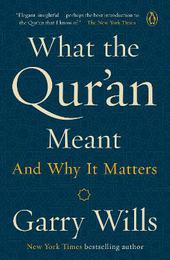
|
What The Qur'an Meant: And why it matters
Paperback / softback
Main Details
| Title |
What The Qur'an Meant: And why it matters
|
| Authors and Contributors |
By (author) Garry Wills
|
| Physical Properties |
| Format:Paperback / softback | | Pages:240 | | Dimensions(mm): Height 197,Width 129 |
|
| Category/Genre | Religion and beliefs
Islam |
|---|
| ISBN/Barcode |
9781101981047
|
| Classifications | Dewey:297.1226 |
|---|
| Audience | |
|---|
|
Publishing Details |
| Publisher |
Penguin Putnam Inc
|
| Imprint |
E P Dutton & Co Inc
|
| Publication Date |
4 December 2018 |
| Publication Country |
United States
|
Description
America's leading religious scholar and public intellectual introduces lay readers to the Qur'an with a measured, powerful reading of the ancient text America's leading religious scholar and public intellectual introduces lay readers to the Qur'an with a measured, powerful reading of the ancient text Garry Wills has spent a lifetime thinking and writing about Christianity. In What the Qur'an Meant, Wills invites readers to join him as he embarks on a timely and necessary reconsideration of the Qur'an, leading us through perplexing passages with insight and erudition. What does the Qur'an actually say about veiling women? Does it justify religious war? There was a time when ordinary Americans did not have to know much about Islam. That is no longer the case. We blundered into the longest war in our history without knowing basic facts about the Islamic civilization with which we were dealing. We are constantly fed false information about Islam-claims that it is essentially a religion of violence, that its sacred book is a handbook for terrorists. There is no way to assess these claims unless we have at least some knowledge of the Qur'an. In this book Wills, as a non-Muslim with an open mind, reads the Qur'an with sympathy but with rigor, trying to discover why other non-Muslims-such as Pope Francis-find it an inspiring book, worthy to guide people down through the centuries. There are many traditions that add to and distort and blunt the actual words of the text. What Wills does resembles the work of art restorers who clean away accumulated layers of dust to find the original meaning. He compares the Qur'an with other sacred books, the Old Testament and the New Testament, to show many parallels between them. There are also parallel difficulties of interpretation, which call for patient exploration-and which offer some thrills of discovery. What the Qur'an Meant is the opening of a conversation on one of the world's most practiced religions.
Author Biography
Garry Wills is a Pulitzer Prize-winning historian and the author of The New York Times bestsellers What Jesus Meant, Papal Sin, Why I Am a Catholic, and Why Priests?, among others. He studied for the priesthood, took his doctorate in the classics, and taught ancient and New Testament Greek at Johns Hopkins University. Professor of history emeritus at Northwestern University, he lives in Evanston, Illinois.
Reviews"Wills has written perhaps the best introduction to the Quran that I know of: elegant, insightful, even at times joyful...his encounter with it is a pleasure to read for anyone as open to discovery as he is." -The New York Times "A useful and worthy interpretation that non-Muslims will find illuminating...Best-selling Wills' stature will draw many readers."-Booklist "A work of intimate and charitable interreligious dialogue." -Publishers Weekly Additional Praise for Garry Wills: "Garry Wills is not only one of the country's most distinguished intellectuals but also one of its most provocative, bringing his learning to bear on great questions of history and contemporary politics." -The New York Times Book Review "America's greatest public intellectual." -Chicago Tribune "Garry Wills is simultaneously one of this country's leading public intellectuals and American Catholicism's most formidable lay scholar. . . . What makes Wills's contribution unique in a country whose shelves of religious books these days overflow with vitriol, bombast and treacle is his singular combination of intellectual integrity and authentically unsentimental spirituality." -Los Angeles Times
|